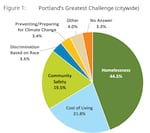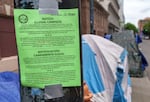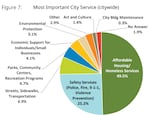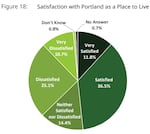The high cost of living in Oregon’s largest city has become a driving force behind Portlanders’ dissatisfaction with their local government. A recent city survey of more than 5,000 Portlanders found that residents believe the city’s high prices and the visible result of those creeping costs — homelessness — are the city’s largest challenges. The majority of those surveyed said that Portland’s government is ineffective.
“Portland’s motto is the city that works, but not much is working,” wrote one unnamed survey respondent.
The survey, conducted by the city’s budget office, offers the most expansive look at residents’ sentiments about their city in years due to the sheer number of people questioned. For example, a 2022 survey on Portland conducted by DHM Research for the Portland Metro Chamber (previously the Portland Business Alliance) only reached 250 people.
Those polled identify homelessness, cost of living and community safety as Portlanders’ top concerns. While these concerns vary slightly across demographics, most of the people surveyed agreed that improving the city’s affordability, especially related to housing, should be a priority for city government.

A chart from the 2022 Portland Insights Survey report conducted by the city of Portland.
Courtesy of the City of Portland
These concerns coincide with skyrocketing costs across the Portland metro area, which has experienced one of the country’s highest cost of living increases over the past decade. While employment rates in Portland have returned to pre-pandemic levels, the median household income is more than $20,000 below the estimated $94,000 needed annually to sustain a family of four. A recent economic report by the Portland Metro Chamber concluded that the city’s housing shortages have driven this shortfall.
At the same time, Multnomah County’s homeless population has surged to more than 6,000 on a given night, exceeding the number of shelter beds available.
One respondent to the city’s survey wrote it was wrong that Portlanders “can work 40 [to] 60 hours and not afford housing, food and basic necessities … Figure it out or the houseless population will continue to grow and grow while all you in power and with money continue to grow and grow.”
Nearly 50% of survey takers said that the city should make funding affordable housing and homeless services its top budgetary priority, while 25% said the city should put public safety programs first. Portland has seen homicides and traffic fatalities reach record levels in recent years.
Asked how the city should address its homeless crisis, more than 60% of respondents recommended building more subsidized housing or substance abuse and mental health clinics. Two percent of those polled said the city should criminalize homelessness. Fifty-eight percent of those polled said that police officers shouldn’t respond to 911 calls about someone sleeping on a sidewalk, and 47% said police shouldn’t respond to emergency calls about someone experiencing a mental health crisis.
These two types of calls are currently addressed by Portland Street Response, a newer city program built to send mental health clinicians to emergencies that don’t require an armed police response.

FILE - A posting is taped near a group of tents in downtown Portland, giving notice that the area will be swept, May 20, 2022.
Kristyna Wentz-Graff / OPB
Support of this type of response differed across populations. Those living east of Interstate 205 and in Southwest Portland were more supportive of armed officers responding to mental health calls. Respondents who identified themselves as Asian, Native Hawaiian or Pacific Islander were also more supportive of an armed response to these calls.
Survey respondents across demographics agreed that police should always respond to 911 calls about property destruction or trespassing. And 63% of all surveyed said that sending police to patrol high-crime areas should be a “high priority” within city government.
While most respondents said they felt safe walking outside in their neighborhood during the daytime, Asian residents and people living in East Portland disagreed.
Portlanders were more divided on nighttime safety. While 41% of those polled said they felt safe walking in their neighborhood at night, 42% disagreed. Of those living east of I-205 in Portland, more than 60% said they did not feel safe at night in their neighborhood. All respondents across demographics agreed that they felt unsafe walking at night in downtown Portland.
“I used to feel safe going downtown and now I avoid the area,” wrote one respondent. “I see so many people running red lights and speeding on the streets. It’s crazy out there.”
Portland has experienced a historically high number of deaths caused by traffic crashes in recent years.

The results of the citywide survey will inform how Portland City Council makes future budget investments.
Courtesy of the City of Portland
Demographics also impacted respondents’ sentiments about city government. Residents who identified themselves as white were more likely to deem Portland city government ineffective, while respondents of color were more likely to agree that city government is effective. The majority of nearly all age groups polled said that the government was not effective. Those between 16 and 29 years old were evenly split on the government’s effectiveness.
This data comes as the city prepares for a radical overhaul of its form of government in 2024. The process will bring a city administrator to City Hall to oversee city bureaus, which are currently led by elected council members. The planned changes were approved by voters in hopes of making city government more effective and fair.
While all age groups agreed that homelessness was the city’s greatest challenge, younger Portlanders were far more concerned with the cost of living than those 60 years and older. Older respondents felt that community safety was a bigger problem than the cost of living.
Male survey takers were far more likely to agree that people in Portland are able to “succeed and thrive” regardless of gender, than women and people who identified as transgender who were polled. Asked if the city allowed people to thrive regardless of their race or ethnicity, 61% of Black residents polled disagreed, while other populations of color were largely undecided.
In all, residents in East Portland reported the highest level of dissatisfaction with Portland as a place to live, while those living in Southeast Portland were the most satisfied.

The report's conclusions reflect the opinions of more than 5,000 Portlanders.
Courtesy of the City of Portland
While the report centers on the city’s greatest problems, it does show what areas residents believe are working. More than half of all respondents said they were satisfied with the quality of garbage and recycling collection in the city. And 64% of respondents said they were satisfied with the quality of city parks and natural areas.
“Despite Portland’s challenges, I am still happy to live in Portland with its excellent public transportation, walkability, tolerance, cultural opportunities, parks, and easy access to outdoor activities,” one person surveyed wrote.
The city collected these results through random surveys mailed to Portlanders in late 2022 and in collaboration with community organizations that work directly with members of racial and ethnic groups that are historically underrepresented in random polling. The report reflects a total of 5,290 responses.
The city last conducted a similar survey in 2019, when researchers came to similar conclusions, with homelessness and cost of living leading respondents’ concerns. Going forward, the city aims to conduct this poll every two years to observe trends and inform how city budget dollars are spent.
“This survey helps us gain valuable insight into how these issues impact communities in Portland differently,” said Mayor Ted Wheeler in a press statement. “This data will inform our budget, unified City Council priorities, and comes at a critical time for Portland as we implement changes to the City’s [form of government].”
Portland City Council will discuss the study’s findings at a Wednesday council meeting.
